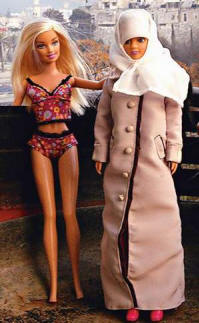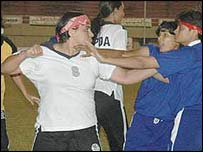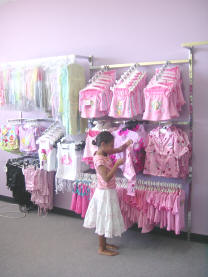|
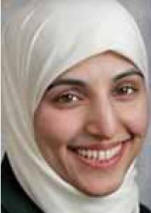 Salma Yaqoob: A Woman of Respect Salma Yaqoob: A Woman of Respect
United Kingdom: FOLLOWING a vibrant election campaign in which Salma Yaqoob almost defeated a Labour MP in one of the safest seats in the country, Salma is continuing her Respect campaigning work with the people of Birmingham, UK.
The things that make this young woman so intriguing are precisely the things that make her just a normal person like you and me. We can all relate to Salma in one way or another. With an Asian background, British born and bred and a strong Muslim identity Salma is the positive face of the fusion of three cultures, Salma is a British Asian Muslim. Being a member of a strong community, she is part of the picture that makes up the cosmopolitan and vibrant city of Birmingham. She is also a wife and a mother. She knows all too well about the struggles of daily life as well as the bigger problems that the national and global community face.
Perhaps thus it is not surprising that she is raising local issues which cause concern to residents such as the problem of rats, rubbish and drugs, as well as national and international issues. As Chair of Stop the War coalition she helped organise 16 coaches to the national demonstration on September 24th
demanding that British troops withdraw from Iraq and the government stop its attack on civil liberties here. Post the horrific 7/7 London bombings, Salma has been working hard to promote community cohesion and understanding, organising and speaking at many public meetings. In addition to numerous radio and magazine interviews, she has also recently appeared on BBC talk shows. Salma responded to the following questions posed to her in an interview:
Tell us a bit about your ethnic and family background?
My parents are from Pakistan. I am from a family of seven children (four brothers and three sisters) and I was born in Bradford but we left to live in Birmingham at a very young age. My husband’s name is Aqil Chaudary. He is a GP and we have three boys aged 2, 8 and 9.
How did you first get involved in the anti-war movement?
It was the events of September 11 that acted as the spur for me to get involved with the Stop the War Coalition. I felt the injustice of what happened to innocent people in the Twin Towers did not justify the most powerful country, bombing one of the poorest in revenge. I was deeply concerned the tide Islamaphobia, after the 9/11 attacks, would engulf all Muslims, both here and abroad. I was relieved therefore when I heard that anti-war activists, all non-Muslim, were openly and loudly proclaiming their opposition to any planned attack on Afghanistan in Birmingham city centre and were planning to set up an anti-war coalition. I attended the first meetings, and was somewhat reluctantly persuaded to take a prominent position as Chair of Birmingham Stop the War Coalition.
Have you always been active in politics?
No - my real passion is psychology and that’s why I chose to become a psychotherapist. I have always felt bad about the injustices in the world, but after 9/11 I decided that I wouldn’t be passive any more. However, I had not planned to play such a public role! Indeed, I was under real pressure not to speak out at all - I was told I would be putting my family at ‘risk’. Some people thought the ‘safe’ thing for us to do as a community was to stay quiet. My conscience would not allow that though and I am proud that through the efforts of thousands of ordinary people real debates began to happen and more people found out the truth of what was going on.
What was the initial reaction of Muslims to your efforts?
I received a lot of support from the youth. However there was a palpable sense of fear throughout the community and a reluctance to speak out. I understood the fear, and felt it myself as well. There comes a point however when recognising fear crosses over to cowardice. Gradually, however, through our efforts to build Stop the War both locally and nationally, more and more people felt confident about getting involved and we grew from being a fringe issue to becoming a central issue. There was also the fact that there were not many women who had played this type of role in our community - so there were some difficulties around that. But over time I feel attitudes have changed, and many people were just relieved someone was speaking up.
What was the initial reaction of non-Muslims to your efforts?
Overwhelmingly supportive. Over the last four years I have spoken to thousands of non-Muslims in trade union branches, Churches, public meetings, outdoor rallies, schools and universities and every time I get a very positive response. What is exciting about the political turmoil of the last few years is that people are more concerned about uniting around such common values, and less concerned about getting caught up on labels.
You’re a Muslim woman, a wife, a mother, a psychotherapist, an activist, how do you juggle and manage all these roles?
With great difficulty! I am lucky in that I have a very supportive husband and family who act as a support network to allow me the space to play the roles that I do. I also draw in help from my friends and colleagues when it comes to babysitting! Without that support I think it would be practically impossible for me to do my work. At the same time I think it is important to aim for a balance so that I can fulfill my different personal commitments (not an easy thing!)
As a Muslim, British woman, what do you feel are the key issues facing Muslim women in Britain today?
There are many cultural practices within the Muslim community which have hindered women’s participation. The difficulties in challenging such practices are compounded by the fact that they are often given a religious veneer despite the fact that such practices limiting women’s involvement in public life have no basis in Islamic theology. Conversely, such anti-women views can also be challenged on the same ground: I persuaded my dad about my right to go to university by quoting him sections from the Quran and Hadith about women’s right to education! Whilst it is true that there are some barriers within the community to enabling Muslim women to fulfill their true potential, things are changing. In fact a lot of young Muslim women are fed up with having to constantly deal with the stereotype that we are all oppressed by our religion or by Muslim men. I think therefore the main challenge that Muslim women face in Britain today is that we are trying to
change attitudes both inside the community towards us, as well as change attitudes towards us in wider society.
What’s in the future for Salma Yaqoob?
I will continue to campaign for justice, both here and abroad, with my colleagues in Stop the War and Respect. There are many challenges ahead - especially after the terrible London attacks in July. I hope to I can rise to these, and be part of changing the climate of fear that is being created, to one of mutual solidarity, compassion and respect. Any message for our readers? Be confident about who you are. Hold on to your principles and they will guide you in whatever situation you find yourself in. Value your potential to contribute to others around you and act on it.
Source: Bolton Council of Mosques (BCOM BCommunity Newsletter) |


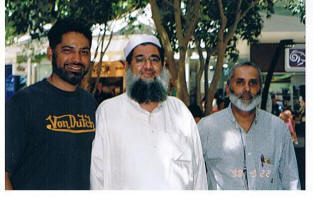

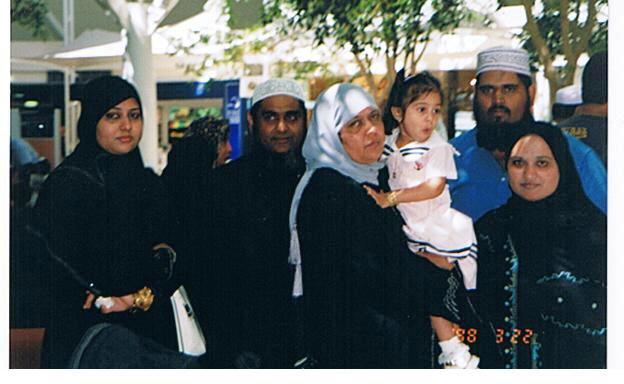
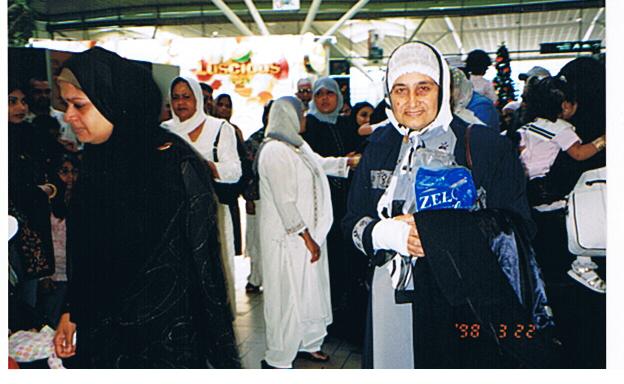


 Salma Yaqoob: A Woman of Respect
Salma Yaqoob: A Woman of Respect